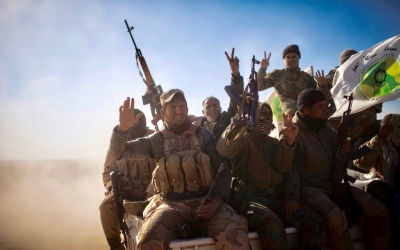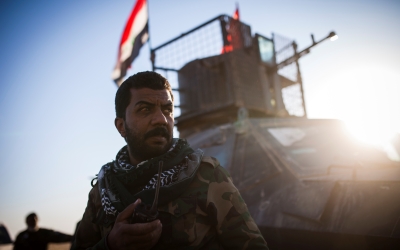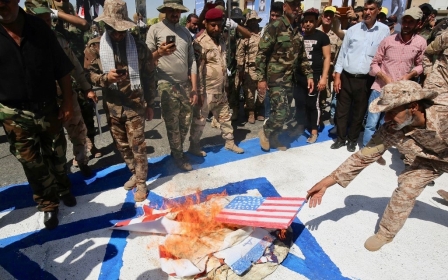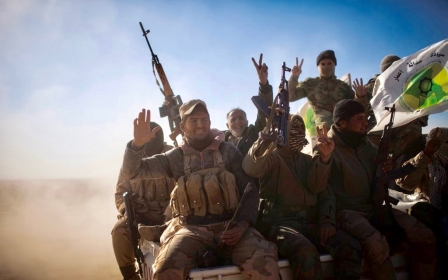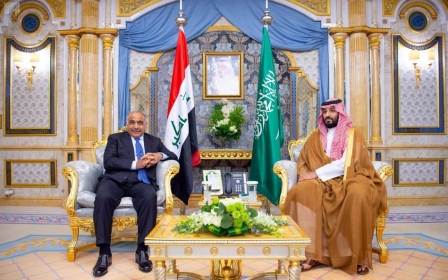Dozens killed in US strikes against pro-Iran group in Iraq and Syria
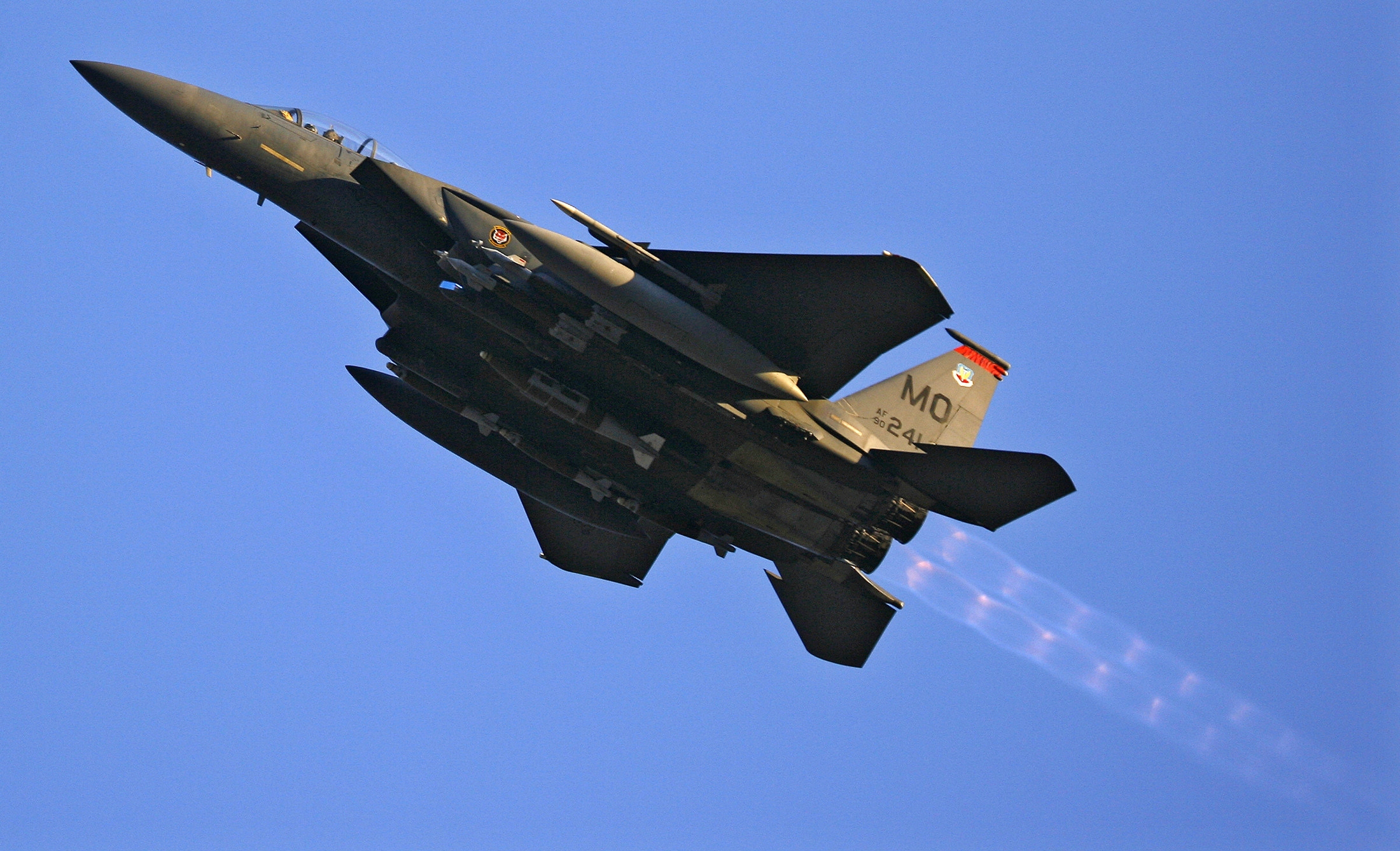
The United States has carried out air strikes against a pro-Iran militant group in Iraq, killing at least 25 fighters, two days after a rocket attack killed an American civilian contractor.
The Pentagon said on Sunday it targeted weapons caches or command and control facilities linked to Kataib Hezbollah (KH) in western Iraq, as well as eastern Syria, in response to a barrage of 30 or more rockets fired on Friday.
US Secretary of State Mike Pompeo said: "We will not stand for the Islamic Republic of Iran to take actions that put American men and women in jeopardy."
Criticising the strikes on Monday, Iranian foreign ministry spokesman Abbas Mousavi said: "US military aggression against Iraqi soil and Iraqi forces is strongly condemned as a clear example of terrorism... and Iran strongly condemns it," according to the state news agency IRNA.
Mousavi added that the US had "shown its firm support for terrorism and its neglect for the independence and sovereignty of countries" by carrying out the attacks. Washington -- itself a key ally of Baghdad -- must accept the consequences of its "illegal act", he said.
Four US service members and Iraqi security forces were also wounded in Friday's attack at the K1 Iraqi military base in Kirkuk, an oil-rich region north of Baghdad.
US Defense Secretary Mark Esper said on Sunday the air strikes were successful, and he did not rule out further action to "deter further bad behavior from militia groups or from Iran".
Esper also said that he and Pompeo had travelled to Florida, where US President Donald Trump has been spending the Christmas holidays, to brief him on the latest Middle East events.
"KH has a strong linkage with Iran's Quds Force and has repeatedly received lethal aid and other support from Iran that it has used to attack" coalition forces, the Pentagon said earlier, referring to the external arm of Iran's Revolutionary Guards.
A few hours later, four rockets exploded near a base housing US troops close to Iraq's capital without wounding anyone, an Iraqi security official told the AFP news agency.
'A violation of Iraqi sovereignty'
Iraqi security and militia sources said at least 25 militia fighters were killed and at least 50 wounded following three US air strikes in Iraq on Sunday.
At least four local KH commanders were among the dead, the sources said, adding that one of the strikes had targeted the militia group's headquarters near the western Qaim district on the border with Syria.
The group said it was still pulling victims from the rubble of bases near Al-Qaim, an Iraqi district bordering Syria, on Monday
The Pentagon said it had targeted three KH locations in Iraq and two in Syria.
The locations included weapons storage facilities and command and control locations the group had used to plan and execute attacks on coalition forces, it said.
A US official, speaking to Reuters on the condition of anonymity, said the strikes were carried out by F-15 fighter jets.
The military spokesman for Iraq's outgoing prime minister Abel Abdul Mahdi decried "a violation of Iraqi sovereignty".
Another powerful pro-Iran faction, Assaib Ahl al-Haq - whose leaders were recently hit with US sanctions - called for Americans to withdraw from Iraq.
"The American military presence has become a burden for the Iraqi state and a source of threat against our forces," it said in a statement.
"It is therefore imperative for all of us to do everything to expel them by all legitimate means."
Caught in the middle
Middle East Eye had reported in September that Abdul Mahdi had been desperately attempting to prevent his country from being used as a battleground in a proxy war between the US and Iran.
Earlier this year, the US military signalled its intention to him to strike an air field held by Iraqi Hezbollah after drone strikes on oil facilities in the Gulf.
Abdul Mahdi was reported by witnesses to the exchange to have told the Americans that he could not stop them striking wherever they wanted, but neither could he prevent retaliatory strikes by Iran-backed militias on US troops and bases in Iraq.
The US strike on Iraqi Hezbollah never took place. Instead, the US allowed Israel to use its drones from SDF bases in northeastern Syria.
In August, Abdul Mahdi came under pressure to publicly accuse Israel of launching drones to attack targets on Iraqi territory.
“Our Prime Minister Adel Abdul Mahdi is between the rock and a hard place,” an Iraqi intelligence source told MEE at the time.
“He told both the Iranians and the Americans that Iraq is exhausted after decades of wars, conflicts and civil war.
"Dragging it into the centre of the proxy war between Iran on one side and the USA and its regional allies on the other will risk irreparable damage to its stability and unity with huge implications for the whole region."
The prime minister’s pleas seemed to be in vain. “Neither side is listening,” the Iraqi source said.
'Decisive US response'
Iraq's parliament accepted the resignation of Abdul Mahdi, after just over a year as prime minister, on 1 December amid street protests against government corruption.
Earlier this month, Pompeo blamed Iran-backed forces for a series of attacks on bases in Iraq and warned Iran that any attacks by Tehran or proxies that harmed Americans or allies would be "answered with a decisive US response".
On 16 December, Esper called on Iraqi authorities to prevent attacks on military bases housing US troops.
A US source told the AFP news agency that pro-Iran factions in Iraq are now considered a more significant threat to US soldiers than Islamic State, whose sweeping offensive in 2014 saw Washington deploy thousands of troops to the country.
Middle East Eye propose une couverture et une analyse indépendantes et incomparables du Moyen-Orient, de l’Afrique du Nord et d’autres régions du monde. Pour en savoir plus sur la reprise de ce contenu et les frais qui s’appliquent, veuillez remplir ce formulaire [en anglais]. Pour en savoir plus sur MEE, cliquez ici [en anglais].


